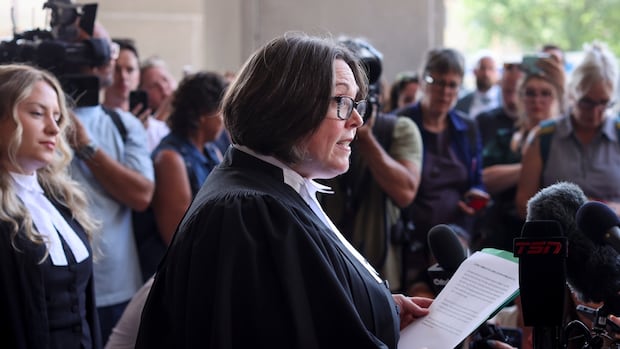When Marie Grgic’s mother was diagnosed with uterine cancer, she said her father had to use his retirement funds to finance costs related to her treatment.
Cancer costs the average patient nearly $33,000, which includes out-of-pocket expenses and lost income, according to the Canadian Cancer Society.
“The cost of cancer is parking, it’s the care, it’s the hospital visits, it’s the hospital beds, the medication,” Grgic said.
“Why are we having to go into our retirement funds, our credit cards, our lines of credit when we have an OHIP card?”
Grgic is among those supporting a private member’s bill that seeks to eliminate hospital parking fees across Ontario, introduced after Nova Scotia removed them earlier this month. The bill is unlikely to pass. But the impact on hospital funding, enforcement and equity for those without vehicles should be addressed, a policy expert says.
NDP MPP Jeff Burch (Niagara Centre) tabled a motion on Wednesday to eliminate the fees for patients, families and hospital workers — the party’s second attempt to address the issue in less than a year.
“This is a common sense proposal, making life more affordable and improving access to health care,” Burch said at a news conference on Wednesday.
Bill would eliminate financial burden, advocate says
The Canadian Cancer Society is among those supporting the NDP bill, said Hillary Buchan-Terrell, the organization’s manager of advocacy for Ontario.
Despite the universal health-care system in Canada, cancer patients feel they are facing an unfair burden of extra costs when they pursue treatment, she said.
“People feel like they have to rob from their future to pay for their present,” she said.
While cancer patients often face frequent hospital visits, Buchan-Terrell said parking fees can add up for anyone who needs to go to the hospital regularly.
Grgic said the proposed bill “would have made a great deal of difference” to her father.
Her mother passed away in November 2016, after her father sold his assets to finance her treatment. He now lives with Grgic’s family — an example of the “ripple effect” of cancer costs, she said.
“He sold his home,” Grgic said. “To see him not be able to travel as freely as he would have liked to, it’s heartbreaking.”
Health-care providers at the Princess Margaret Cancer Centre in Toronto are offering workshops to support the unique needs of younger patients between the ages of 18 and 39, such as managing student debt while undergoing treatment.
Grgic, who was diagnosed with cancer herself in November 2022, said she spent about $400 a month on hospital parking passes for at least a year as she underwent treatment.
She said she and her husband opened lines of credit and went into credit card debt to finance expenses related to her care.
“This motion would eliminate that financial burden to so many families [and] their caregivers,” she said.
The Ontario Nurses’ Association also fully supports the motion, said Erin Ariss, the union’s provincial president.
“The cost of living is astronomical,” she said. “This, along with our wages not keeping par with inflation, has created a huge burden on nurses and healthcare professionals.”
B.C. reinstated paid parking at hospitals in 2022
Hospitals in Ontario began charging for parking in the 1980s after a push from the provincial government at the time “to get hospitals to be run more like businesses,” said Dr. Michael Rachlis, a public health physician and professor at the University of Toronto’s Dalla Lana School of Public Health.
Parking could cost as much as $1,000 a month in some hospitals until 2016, when the Ontario government, under Kathleen Wynne, put restrictions on the fees, he said. Now, he said parking fees at hospitals typically max out at around $350 a month.
Health Minister Sylvia Jones appeared to refer to this existing policy at a news conference on Wednesday, saying limits are already in place on parking fees.
“I understand that there are challenges when people want and need to visit our hospitals, but there is also the other side where we want to invest in people, in equipment, in capital, and that’s what we’ve been doing with our investments,” she said.
If hospitals stopped charging for parking, they could lose roughly between $50 to $100 million in funding in Ontario, Rachlis said. Hospitals use revenue from parking for day-to-day budgetary operations, he said.
If they lose that money and it’s not replaced, “that means that patients are going to get worse care,” he said.
“The provincial government should not get any credit for eliminating hospital parking fees unless they provide that backfill funding to the hospitals,” Rachlis said.
Earlier this month, Nova Scotia eliminated parking fees for all health-care facilities. Hospital foundations and other organizations that depend on fees for revenue will have any shortfall covered by the provincial government, according to a news release from April.
Nova Scotia will spend an estimated $19 million annually on the change, the release said. A ticket validation system will be implemented at some sites to ensure free parking is only used by patients, visitors and staff.
If Ontario does eliminate hospital parking fees, Rachlis said the government also needs to take the lead on how free parking would be implemented and enforced.
British Columbia reinstated paid parking at hospital facilities in March 2022 after spending $20 million waiving fees for just over two years. Non-hospital users were taking up parking spots, making it difficult for patients, staff and visitors to park, according to a release at the time.
A new study paints a dire picture of the extreme stress affecting many of Ontario’s health care workers. The study’s authors interviewed more than two dozen workers, including nurses, PSWs, and cleaners and they say if immediate action isn’t taken, it could have a devastating impact on the already-strained healthcare system. CBC’s Tyler Cheese has the story.
Poorest in Ontario excluded, policy expert says
While requiring free parking in hospitals would benefit car owners, Rachlis said there would be no benefit to people who need financial support the most.
“The poorest people in this province, in this country, do not have motor vehicles,” he said.
“Every time we subsidize people with cars and we don’t put the money into public transportation, we are making those people worse off.”
Rachlis said he thinks the government should spend more money on public transit whenever it implements a policy that benefits vehicle owners.
“There are a lot of people who won’t benefit at all from this [bill] if they don’t have a car and they’re taking their Ubers to visit someone and support them in the hospital,” Rachlis said.
“And there’s other people who are going to have to pay more money in taxes to support the hospitals that we have, because they’ll be missing the parking fees.”








